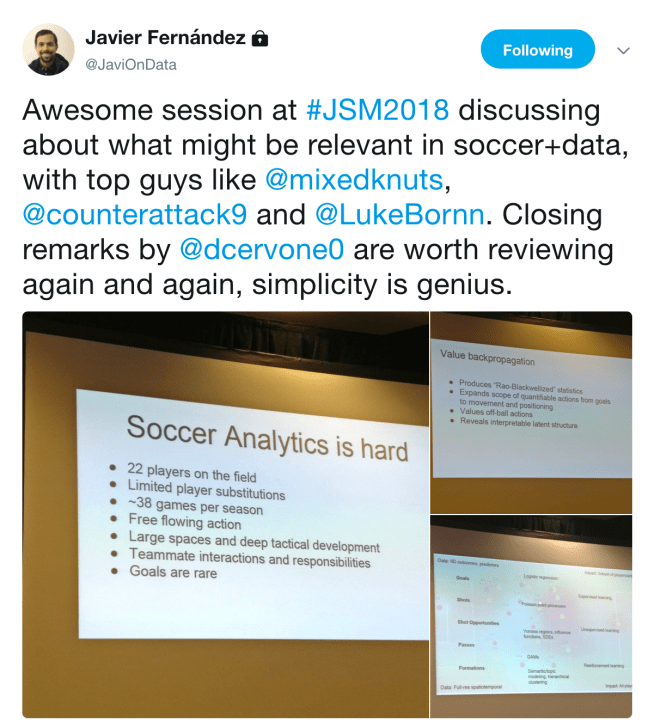
Yesterday, I was on my way to adjudicate a public speaking event at a school in Braidwood.
It was a short walk and on my way my phone alerted me to some exchanges about #JSM2018. Amongst others, Michael Lopez shared this observation:
“Data science takes time. Sports don’t give you time” – @mixedknuts at #JSM2018 on the quandary of working in an industry that can’t extend deadlines
— Michael Lopez (@StatsbyLopez) August 1, 2018
The quote came from Ted Knutson at the Getting Shots Inside the Box-Cox, Transformational Soccer Analytics session at the JSM’s Section on Statistics in Sports.
I had a quick look at what was going on in Vancouver and then went on to the school to hear pupils speaking on the topic “Every Family Has A Story“. I had the good fortune to listen to Year 5s share their family stories. Each pupil had three minutes to share their story. In the time it takes to play a game of football game I met families with ancestors that:
- Were on the First Fleet
- Participated in the cavalry charge at Beersheba
- Have farmed in Braidwood from the earliest days of settlement
- Left Braidwood for the WW1 battlegrounds of Europe some to return others to lie in foreign fields
- Found refuge from persecution in Russia and in Germany
There were contemporary stories too of families moving to the area from cities, other regional towns and other countries.
In all there were 17 stories shared. I was entranced and humbled by their stories. I thought they showed great courage in speaking in public, particularly in the presence of someone called an adjudicator.
It prompted me to think not only how the pupils’ teachers might understand the richness and diversity of families’ experiences and support personal learning journeys. It was a great time, I think, to engage in conversations about the excitement of public speaking and how that differs from public reading (some students were nervous and tended to read out their prompt notes without any eye contact with their audience).
I had turned my phone of during the event. After walking home, I discovered that stories were being shared in Vancouver too:
https://twitter.com/LukeBornn/status/1024699959642226688
… that crossed cultures to provide opportunities for connections:


I wondered if the participants in these conversations came up with a consensus about how we might have longer term conversations with coaches.
Perhaps fragments of thought might help us. Mark Upton is up to fragment 12 in his conversation about sport systems. In 12 there is a one-liner that can unlock powerful exchanges:
To think that we get to make a plan and direct the organisation toward a pre-specified outcome is just an illusion… a failure to recognise the complexity of the systems we are dealing with.
Perhaps clarifying what we do might help too. Cassie Kozyrkov notes in the context of data science:
Applied data science is a team sport that’s highly interdisciplinary. Diversity of perspective matters! In fact, perspective and attitude matter at least as much as education and experience.
She identifies:
- Data engineer
- Decision-maker
- Analyst
- Expert analyst
- Statistician
- Applied machine learning engineer
- Data scientist
- Analytics manager/ data science leader
- Qualitative expert/ social scientist
- Researcher
Cassie concludes her discussion with an analogy of innovating in the kitchen:
… if you personally want to open an industrial-scale pizzeria that makes innovative pizzas, you need the big team or you need to partner with providers/consultants.
… if your goal is just to make standard traditional pizza, you don’t even need all that: get hold of someone else’s tried and tested recipe (no need to reinvent your own) along with ingredients and start cooking!
I wondered if coaches are able to give us time, as an antidote to being too busy, we could start to have meaningful conversations. These are for me Year 5’s public speaking. The alternative is public reading. In the latter case we just provide data and are unable to start a conversation about insight.
In the process of writing this post my mind has wandered from memories of Vancouver, to thoughts of an 18th century sailing ship, a cavalry charge at Beersheba, the horrors of trench warfare for very young boys from country NSW and my recall of moments of close connection with coaches.
I am hopeful that we can in our interactions with coaches make memories and build stories … even difficult ones.
Fifty years ago, W E H Stanner gave the Boyer Lectures. In them, he argued that “Australia’s sense of its past, its very collective memory, had been built on a state of forgetting”.
It is a structural matter, a view from a window which has been carefully placed to exclude a whole quadrant of the landscape. What may well have begun as a simple forgetting of other possible views turned under habit and over time into something like a cult of forgetfulness.
Our occupational culture has a rich array of skills to share in sport.
One of these is as an audience for stories, another is sharer of stories. For me, the exciting one is as co-creator of stories with coaches … that open up whole quadrants of the landscape.






